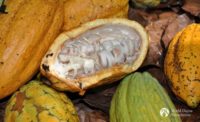Mars, Incorporated, ECOOKIM and Fairtrade have launched a cocoa farmer livelihoods improvement program — Livelihoods Ecosystem Advancement Program (LEAP) — designed to address persistent barriers to cocoa farmers’ ability to achieve a living income.
The program aims to support 5,000 smallholder farmers in Côte d’Ivoire on a path to a living income by 2030. The findings from the initiative will be used to create a blueprint of interventions that can be scaled across the cocoa supply chain.
“This program takes a holistic approach and seeks to address all elements necessary for a living income, rather than treating them in isolation or searching for ‘silver bullets,'" said Aminata Bamba, ECOOKIM head of sustainability. “Farmers may know best what needs to be done to improve their crops and their livelihoods but might not have the market support to make those changes.”
“Our goal of creating a more inclusive, modern and sustainable cocoa supply chain can only be achieved if farmers are fairly rewarded for their crucial role in producing the cocoa used in beloved chocolate brands," said Anne-Marie Yao, Mars director for public affairs, West Africa. "That’s why we developed our Cocoa for Generations strategy, and it’s why today we’re working with Fairtrade and ECOOKIM to develop an ambitious blueprint that may be scaled to enhance farm resilience and support cocoa farmers on a path to a living income.”
In this new effort, Fairtrade, ECOOKIM and Mars are working to help remove the obstacles in their path, particularly lack of access to finance and the need to adapt to climate change.
“I am particularly impressed with this approach, which seeks to be holistic and combine best practice interventions to achieve living income," said Minister for Agriculture and Rural Development M. Kobenan Kouassi Adjoumani. "As emphasized by the partners, growers know better than anyone what needs to be done to improve their crops and livelihoods. I particularly appreciate that the partners are committed to learning together alongside growers to understand what works best for them and their households. The 'try and learn' approach of the program is extremely interesting, and I, personally, look forward to discovering what has worked well and what hasn't.”
Most cocoa is grown on small family farms with little access to electricity, clean water, reliable roads or quality schools. Compounding these challenges are negative effects of climate change and persistent market failures, such as disconnection from formal financial systems, underdeveloped cooperative management practices and lack of alternative income sources to offset market volatility. These obstacles can leave cocoa farmers in poverty, unable to invest in or grow their businesses due to factors beyond their control. Despite past industry attempts to improve farmer livelihoods, smallholder farmer poverty has not been eradicated.
Understanding there is no "average" cocoa farmer, the program will focus on creating person-centric development journeys that recognize the different starting points and ambitions of each cocoa farmer. This initiative will test and ascertain the most impactful interventions for improving living income for more than 5,000 cocoa farmers across three priority areas:
- Strengthening farmer cooperatives and market access for cocoa and other farm and non-farm goods.
- Diversifying farmers’ incomes so both women and men farmers are less dependent on cocoa and can make money from other sources.
- Expanding access to financial services like savings and loans, and mobile banking, so farmers can invest in their farms and their futures.



